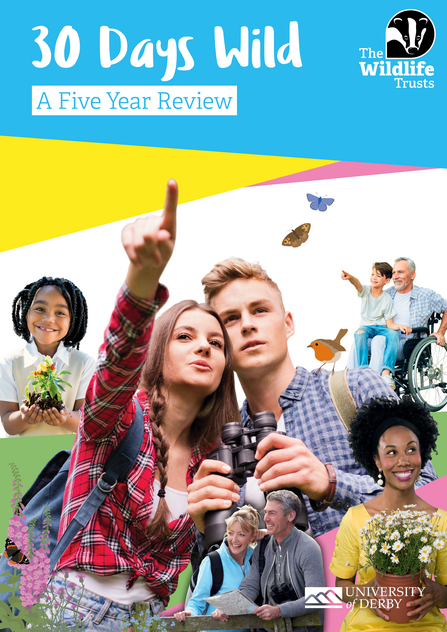
30 Days Wild 5 Year Summary Review
What is 30 Days Wild?
30 Days Wild is the UK’s one and only month-long nature challenge from The Wildlife Trusts. It invites everyone to do something wild every day in June, connecting us all with the beauty and wonder of our natural world. In 2024 we’re celebrating 10 YEARS of 30 Days Wild.
It's official! 30 Days Wild makes us feel happier and healthier
Over the past five years, the University of Derby has been analysing data from 30 Days Wild to measure the impact of the challenge on participants.
Building on three peer-reviewed papers, the University of Derby has evaluated survey responses from more than 1,000 people over five years and discovered the enduring effects on wellbeing from participation in 30 Days Wild – the positive effects are still felt two months after the challenge is over.
Key findings:
- 30 Days Wild resulted in very significant increases in nature connectedness for those who began with a weak connection to nature – their nature connectedness rose by 56%
- 30 Days Wild boosted the health of participants by an average of 30%.
- 30 Days Wild made people, particularly those who started with a relatively weak connection to nature, significantly happier
- 30 Days Wild inspired significant increases in pro-nature behaviour
References
Capaldi, C. A., Dopko, R. L., and Zelenski, J. M. (2014). The relationship between nature connectedness and happiness: a meta-analysis. Frontiers in Psychology, 5, 1-15.
Cervinka, R., Röderer, K., and Hefler, E. 2012. Are Nature Lovers Happy? On Various Indicators of Well-being and Connectedness with Nature. Journal of Health Psychology 17(3): 379-388. doi: 10.1177/1359105311416873
Gatersleben, B., & Andrews, M. (2013). When walking is not restorative – the role of prospect and refuge. Health and Place, 20, 91-101.
Howell, A. J., Dopko, R. L., Passmore, H, Buro, K. (2011). Nature connectedness: Associations with well-being and mindfulness. Personality and Individual Differences, 51, 166-171.
Howell, A. J., Passmore, H. A., and Buro, K. (2012). Meaning in Nature: Meaning in Life as a Mediator of the Relationship Between Nature Connectedness and WellBeing. Journal of Happiness Studies. Vol 13(6), 1681-1696.
Hunt, A., Stewart, D., Richardson, M., J., H., Bragg, R., White, M., & Burt, J. (2017). Monitor of Engagement with the Natural Environment: developing a method to measure nature connection across the English population (adults and children). York: Natural England.
Kaplan, S. (1995). The restorative benefits of nature: toward an integrative framework. Journal of Environmental Psychology, 15, 169-182.
Kaplan, R. (2001). The Nature of the view from home: psychological benefits. Environment and Behavior, 33, 507-542.
Kellert, S. (1993). ‘The biological basis for human values of nature’, in S.R. Kellert and E.O. Wilson (eds.), The Biophilia Hypothesis (Washington: Island Press), pp. 42–69.
Lin, B. B., Fuller, R. A., Bush, R., Gaston, K. J., and Shanahan, D. F. (2014). Opportunity or orientation? Who uses urban parks and why? PLoS ONE p. e89422, 10.1371/journal.pone.0087422
Loureiro, A. & Velosos, S. (2014). Outdoor exercise, well-being and connectedness to nature. Psico, 45(3), 299-304.
Lumber, R., Richardson, M., Sheffield, D. (2017). Beyond knowing nature: Contact, emotion, compassion, meaning, and beauty are pathways to nature connection. PLoS ONE 12(5): e0177186. https://doi.org/10.1371/journal.pone.0177186
Mayer, F. S. and Frantz, C. M. (2004). The connectedness to nature scale: a measure of individuals’ feeling in community with nature. Journal of Environmental Psychology, 24, 503-515.
Nisbet, E. K., Zelenski, J. M., and Murphy, S. A. (2011). Happiness is in our nature: exploring nature relatedness as a contributor to subjective well-being. Journal of Happiness Studies, 12, 303–322. doi: 10.1007/s10902-010-9197-7
Otto, S.; & Pensini, P. (2017). Nature-based environmental education of children: Environmental knowledge and connectedness to nature, together, are related to ecological behavior. Global Environmental Change, 47, 88-94.
Richardson, M., Hussain, Z., and Griffiths, M. D. (2018). Problematic smartphone use, nature connectedness, and anxiety. Journal of Behavioral Addictions, 7(1), 109-116.
Richardson, M. McEwan, K., & Garip, G. (2018). 30 days wild: Who benefits most? Journal of Public Mental Health, 17(3), 95-104.
Richardson, M. & McEwan, K. (2018). 30 Days Wild and the relationships between engagement with nature’s beauty, nature connectedness and well-being. Frontiers in Psychology, 9:1500. Doi: 10.3389/fpsyg.2018.01500
Richardson, M., Cormack, A., McRobert, L., and Underhill, R. (2016). 30 Days Wild: development and evaluation of a large-scale nature engagement campaign to improve well-being. PLos ONE 11(2):e0149777. Doi:10.1371/journal.pone.0149777
Russell, R., Guerry, A. D., Balvanera, P., Gould, R. K., Basurto, X, Chan, K. M. A., Klain, S., Levine, J., and Tam, J. (2013). Humans and nature: how knowing and experiencing nature affect well-being. Annual Review of Environment and Resources, 38, 473-502.
Schultz, P. W. (2000), 'Empathizing with nature: The effects of perspective taking on concern for environmental issues', Journal of Social Issues, 56(3), 391–406.
Schultz, P. W. (2001). The structure of environmental concern: concern for self, other people, and the biosphere. Journal of Environmental Psychology, 21, 327-339.
Wilson, E.O. (1984). Biophilia: The Human Bond with Other Species. Cambridge: Harvard University Press.
Zhang, J. W., Howell, R. T., Iyer, R. (2014). Engagement with natural beauty moderates the positive relation between connectedness with nature and psychological well-being. Journal of Environmental Psychology, 38, 55-63.


